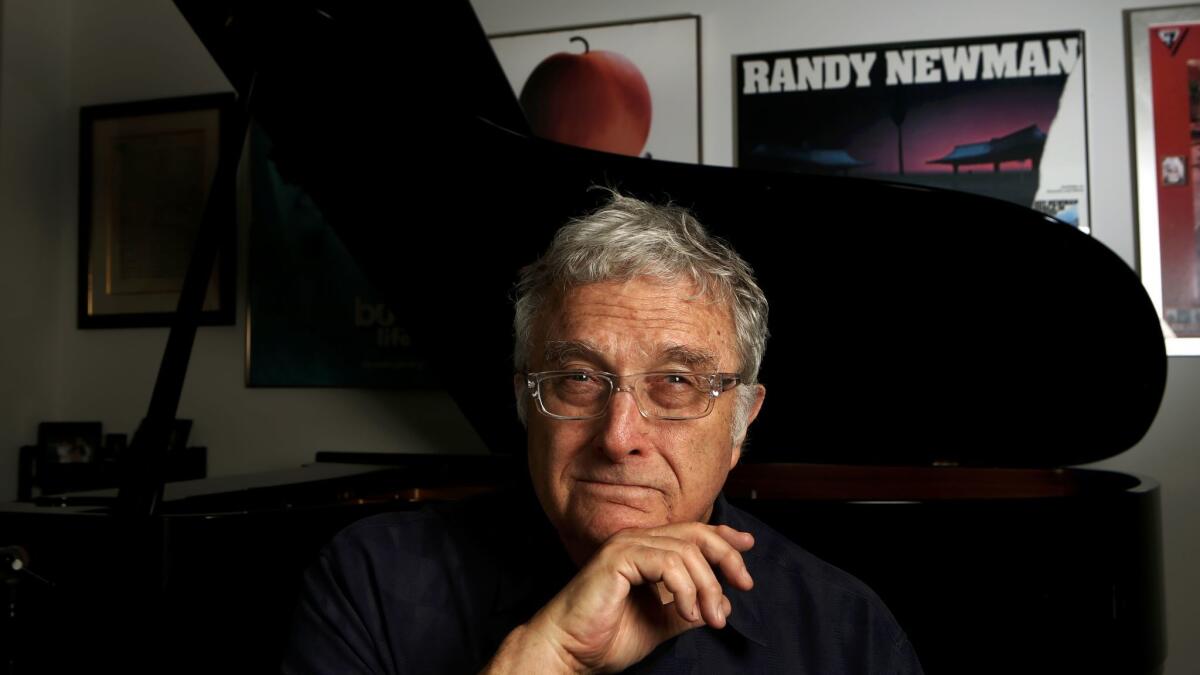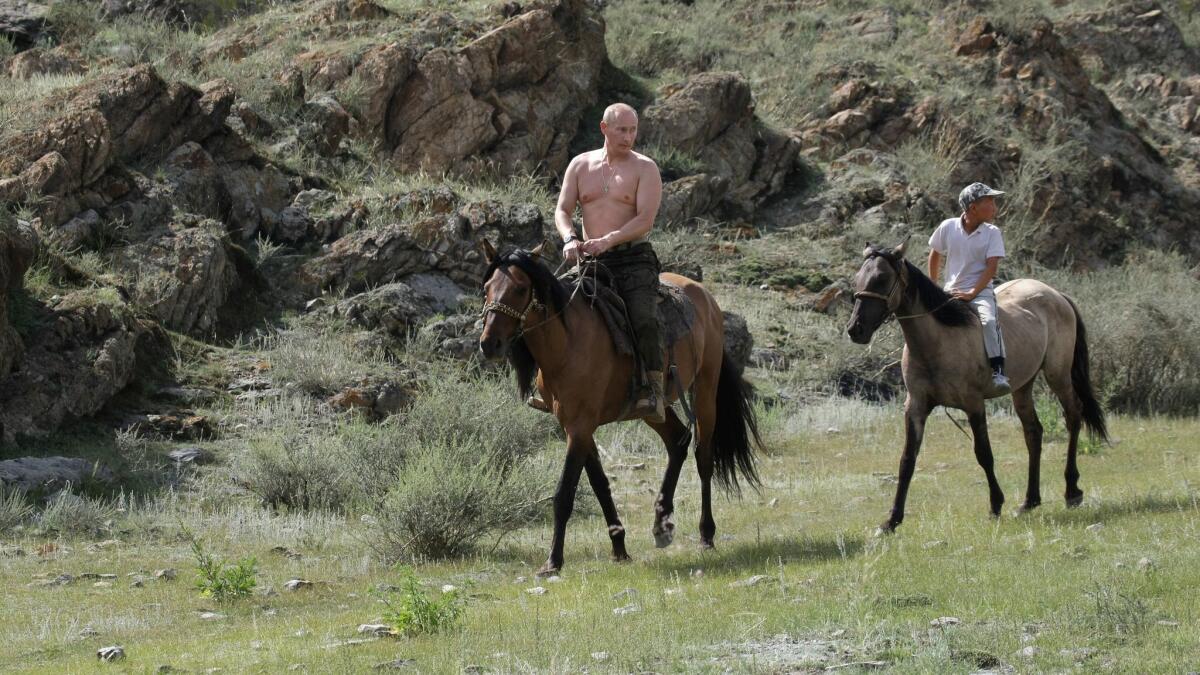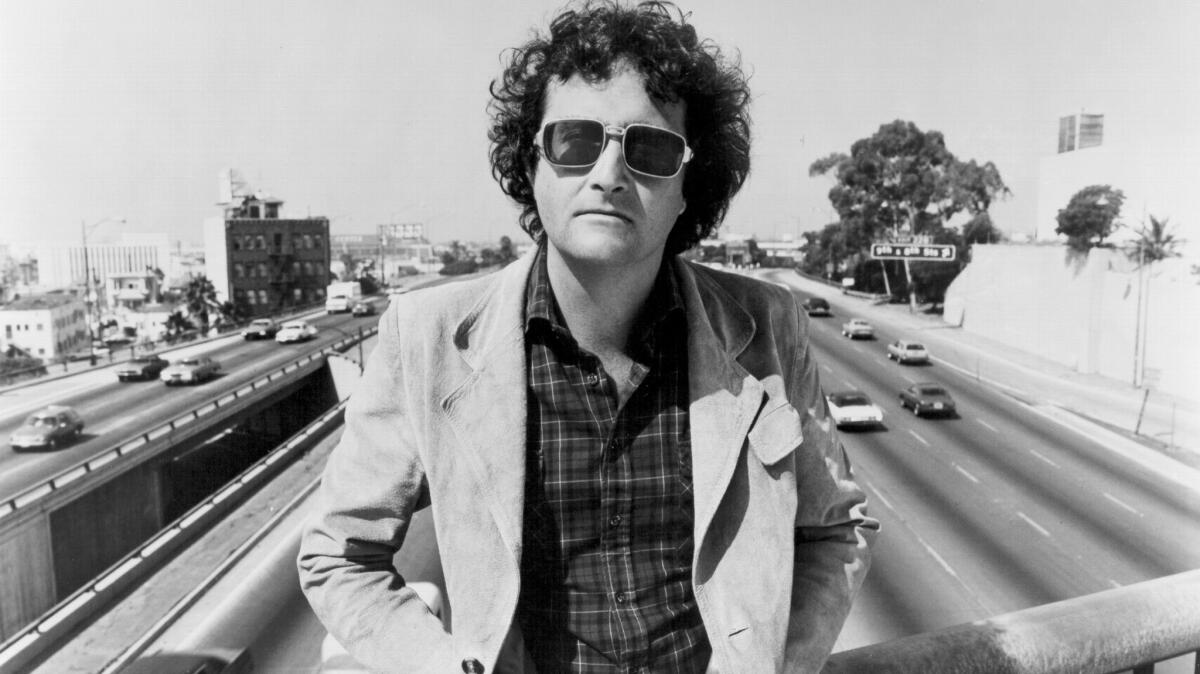Randy Newman weighs in on Putin, science vs. religion and more in new ‘Dark Matter’ album

- Share via
As one of pop’s master satirist-humorists, it’s likely no surprise that for his first studio album in nine years, songwriter/composer Randy Newman has set his artistic crosshairs on Russian President Vladimir Putin.
After all, this is the artist who inspired anger and protests with “Short People,” his 1977 sendup of racism. Earlier, in a takedown of duplicitous foreign policy in “Political Science,” he sarcastically suggested that the United States “drop the ‘big one,’ and see what happens.” Then there’s “I Love L.A.,” his paean to his native town that deftly wove in an allusion to this city’s homeless problem.
For the record:
1:34 a.m. Jan. 23, 2025An earlier edition of this post said Randy Newman has released new studio albums at a rate of about one every four years. The pace is one almost every five years for the 11 albums he has released beginning with his 1968 debut album. It also referred to the 40 years that had elapsed since that release. It is nearly 50 years.
And now Newman has gone topical again with “Putin,” a centerpiece of his new album, “Dark Matter.”
Due to their relative scarcity, any new work from Randy Newman is an event. Since his 1968 debut, he’s released just 10 studio collections — a rate of about one every five years. That pace has slowed in the last three decades, during which he’s put out just four. Of course, there’s also his composing work, as Newman has scored more than 20 films, including Disney/Pixar’s latest, “Cars 3.”
REVIEW: Randy Newman’s ‘Dark Matter’ shows why he’s still his best interpreter »
“Randy Newman is a national treasure,” said Eagles co-founder and longtime friend Don Henley. “He’s also probably the most misunderstood and underappreciated recording artist alive.
“He’s one of the only living songwriters who can get ridicule and empathy into the same song. Sometimes, he works in the realm of irony; other times, he’s a heart-on-his-sleeve romantic,” he said. “The combination of his lyrical genius and his deep ability as an orchestrator and composer is powerful stuff. There’s nobody quite like him.
“I said when I inducted Randy into the Rock & Roll Hall of Fame [in 2013], that what you hear in his music is America, in all its shame and all its glory…. He mines so many rich veins of American musical culture and synthesizes them in a way that nobody else has done.”
Newman is clearly thinking big once again on “Dark Matter.” The opening track, “The Great Debate,” is an 8½ minute suite, a faceoff between science and religious faith that plays out cinematically, with a narrator interacting with several distinct other points of view expressed by varied characters who are fleshed out by a shifting musical mise-en-scene.
In the case of “Putin,” Newman proved to be a little prescient. The song was written long before reports of Russia’s interference in the 2016 U.S. presidential election came to light, and well ahead of President Trump’s admiration for the Russian leader were regularly being voiced.

“It’s really not that critical of him — that’s what surprises me,” Newman, 73, said recently, sitting at a shaded picnic table in the backyard of the Pacific Palisades home he has shared with his wife, Gretchen, and children for the last 20 years. The house, overlooking the skyline of Beverly Hills and Century City to the east, is in the same neighborhood where he spent much of his childhood.
“Putin” began a few years ago, but Newman was less interested in the leader’s policies. Instead, Newman zeroed in on what he saw as a quest for fame, as inspiration struck when images of the shirtless ex-KGB officer riding a horse around the Russian countryside began to circulate on the Internet.
“He can drive his giant tractor across the Trans-Siberian plain/ He can power a nuclear reactor with the left side of his brain,” he sings.
“I wondered at it: What does he need with that — why? He’s the richest man there is. He’s the most powerful. What’s he want?” Newman said, also revealing the seemingly insatiable curiosity that compels him to keep writing and recording nearly 50 years after the release of his strikingly idiosyncratic debut album “Randy Newman” (subtitled “Something New Under the Sun”).
His conclusion about Putin’s public braggadocio: “I think he also wants to be Tom Cruise. He wants to be like a movie star — a superhero, a strongman.
“There are videos of him throwing bigger young men around,” Newman said. “It interested me, but it also worried me. It’s an oddly baby-ish sort of behavior…. And this was before I knew there was going to be this giant baby — this giant, evil baby — running our country.”
So yes, as that statement would imply, Newman has written a song about Trump. But he has chosen to keep the full tune to himself, at least for now. As he’s stated in a number of other interviews, he chose fairly vulgar language to capture the defining persona of someone he considers to be a vulgar public figure, as his song draws particular attention to the president’s private parts.
“I just didn’t want to add to the problem of how ugly the conversation we’re all having is,” he recently told the U.K.’s the Guardian.
Besides, such topical material can veer dangerously close to the realm of novelty.
“I don’t like writing songs that will just go away,” he said. “Someday the Putin song will go away. Someday ‘A Few Words in Defense of Our Country’ will. I thought it was already gone, but it came back.”
He’s referring to the song from his 2008 album “Harps and Angels,” in which he observed, “Now the leaders we have/ While they’re the worst that we’ve had/ Are hardly the worst/ This poor world has seen.”
“That I wrote,” he said, “because I thought the [George W.] Bush administration was as bad as we’d done, since [15th president James] Buchanan anyway, or ever would do. And man, now it’s not even close. I wish he were back. I can play that song now and audiences really react to it.
“There was an article in some paper that said [Trump] is like a character in a Randy Newman song,” he said. “And he is. I mean, I don’t think of those people as quite real….That’s why he’s proving a problem in some ways for comedians in that it’s so much. With satire you want to [be able to] exaggerate a little bit.”
Among the outlandish characters on “Dark Matter”? Randy Newman himself.
In “The Great Debate,” he calls out for the “untrustworthy narrator” — a device he’s often employed throughout his career, which has netted him two Academy Awards, six Grammys and three Emmys, among other accolades.
In “The Great Debate,” a character called True Believer outright castigates the song’s narrator: “Sir, do you know what you are? You’re an idiot, you’re a straw man, a fabrication. You see, the author of this little vignette, Mr. Newman, a self-described atheist and commonist, creates characters like you as objects of ridicule.”
It adds a layer of richness to the tale, in which scientists debate religious folks over topics such as dark matter, evolution and global warming, all hot-button issues in today’s world of divisive political discourse.
“You start to think, ‘Well, this guy’s got an open mind’ and then he just gets mowed down by the power of the stuff connected with religiosity, with faith, because it’s just mighty,” said Newman, who does indeed consider himself an agnostic, if perhaps not a full-blown atheist.

Newman’s not-so-secret weapon in each of his songs is the music he supplies for the words of his narrators, a wealthy amalgam of pop and classical source material. Here, he taps the blues, gospel, folk, ragtime, chamber and symphonic music, referencing at various points Aaron Copland, Gustav Mahler, Dmitri Shostakovich, Alban Berg and film composers.
His biggest influence from the latter, he said, would be his uncle, Academy Award-winning Alfred Newman, probably the best known of his three composer-uncles, which also includes Emil and Lionel Newman.
He believes the canvas of pop music doesn’t have to be limited, structurally, thematically or sonically — although albums as creatively expansive as “Dark Matter” don’t often top sales charts.
“You can do it,” he said. “When I first began writing this way, with characters in it, I always wondered why more people didn’t do it. And I think maybe it’s because it’s not a great idea for the medium [of pop music]. Maybe it’s meant to be a direct I-love-you, you-love-me kind of medium.
“But you can do this other stuff and it comes off,” he said. “And I have such an affection for comedy, that I like to laugh and I like to make people laugh, so I do it.”
Some of his songs about the human race are as sharp-edged as any of Mark Twain’s darkest writings — case in point, 1972’s “God’s Song,” in which the Lord tells his image-sharing two-legged creations that, “Man means nothing, he means less to me, than the lowliest cactus flower.”
Yet Newman insists that he’s no misanthrope.
“I’m not cynical about the individual behavior, but I’m shocked by how bad the mass behavior has been politically,” he said. “I don’t think there are 40 million [jerks] in this country. They’re not [jerks]. There are some nice people that voted for this really bad example of an American.”
Yet the album concludes with the heart-rending ballad “Wandering Boy,” which he said was inspired by an 1877 song, “Where Is My Wandering Boy To-Night.” It’s a song he sang at a private memorial last year for Eagles co-founder Glenn Frey.
It’s from the perspective of a parent expressing love and concern for a child who has disappeared, perhaps become homeless, and it reveals the most heartfelt side of Newman’s music.
“It got me too, and it doesn’t happen very often,” he said. “I had trouble playing it for people just after I wrote it. It must be something in my past that it resonates with.”
Meanwhile, his “I Love L.A.” has become especially celebratory this year. The song, cued up after every Dodgers win at Dodger Stadium, has been blaring quite often during the squad’s run for the National League West title.
“To be honest with you, for years I haven’t been a Dodger fan, despite the song,” he said. “I sort of root for the Angels because of Mike Trout.”
But even this skeptic is ready to join the bandwagon.
“What’s not to like? They’ve got a young team, they’ve got a great team. It’s unbelievable. They’re really good.”
Follow @RandyLewis2 on Twitter.com
For Classic Rock coverage, join us on Facebook
More to Read
The biggest entertainment stories
Get our big stories about Hollywood, film, television, music, arts, culture and more right in your inbox as soon as they publish.
You may occasionally receive promotional content from the Los Angeles Times.







